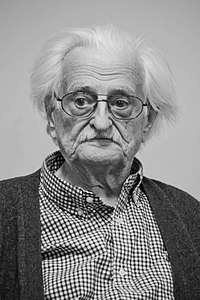Marlen Khutsiev
| Marlen Khutsiev PAU | |
|---|---|
 Marlen Khutsiev in 2018 | |
| Born |
4 October 1925 Tbilisi, Georgia, USSR |
| Occupation | Director, screenwriter |
| Years active | 1952–present |
| Awards |
|
Marlen Martynovich Khutsiev (Russian: Марле́н Марты́нович Хуци́ев; born October 4, 1925 in Tbilisi) is a Georgian-born Soviet and Russian filmmaker best known for his cult films from the 1960s, which include I Am Twenty and July Rain. He was named a People's Artist of the USSR in 1986.[1]
Biography
Khutsiev's father, Martyn Levanovich Khutsishvili (the family's original Georgian surname), was a lifelong Communist who was purged by Joseph Stalin in 1937. His mother, Nina Mikhailovna Utenelishvili, was an actress. Khutsiev studied film in the directing department at the Gerasimov Institute of Cinematography (VGIK), graduating in 1952. He worked as a director at the Odessa film studio from 1952 to 1958, and worked full-time as a director at Mosfilm from 1965 onwards.
Khutsiev's first feature film, Spring on Zarechnaya Street (1956), encapsulated the mood of the Khrushchev Thaw and went on to become one of the top box-office draws of the 1950s. Three years later, Khutsiev launched Vasily Shukshin "as a new kind of popular hero" by starring him in Two Fyodors.[2] His two masterpieces of the 1960s, however, were panned by the authorities, forcing Khutsiev into something of an artistic silence. Since 1978, Khutsiev has taught film directing master classes at the VGIK.
His 1991 film Infinitas won the Alfred Bauer Prize at the 42nd Berlin International Film Festival.[3]
Selected filmography
| Year | Title | Notes |
|---|---|---|
| 1956 | Spring on Zarechnaya Street | |
| 1965 | I Am Twenty | |
| 1967 | July Rain | |
| 1970 | It Was in May | |
| 1970 | Shine, Shine, My Star | |
| 1992 | Infinitas |
Honours and awards
- Order of Merit for the Fatherland;
- 2nd class (29 May 2006) - for outstanding contributions to the development of national cinema and many years of creative activity
- 3rd class (25 December 2000) - for outstanding contribution to the development of cinema art
- 4th class (9 April 1996) - for services to the state, many years of fruitful work in the arts and culture
- Order of Honour (5 October 2010) - for outstanding contribution to the development of the domestic art of film and many years of creative activity
- Order of the Badge of Honour (1975)
- Jubilee Medal "In Commemoration of the 100th Anniversary since the Birth of Vladimir Il'ich Lenin" (1970)
- People's Artist of the USSR (1986)
- People's Artist of the RSFSR (1977)
- State Prize of the Russian Federation (7 December 1993)
- Special Prize of the Russian Federation President (12 June 1999) - for outstanding contribution to the development of Russian cinema
- "Golden Aries" award and winner of "The Man Film of the Year" (1995)
- Prize of the city of St. Petersburg "he is a living legend of the national cinema" - V Festival "Viva Cinema of Russia" (1997)
- Moscow Mayor's Award (1999) - a unique contribution to the development of culture in Moscow
- National Award in the field of documentary film and television "laurel branch" for 2002 in the category for contribution to Cinema Chronicle
- "Triumph" Award (2004)
- Nika Award in the "honour and dignity" (2006)
References
- ↑ Peter Rollberg (2016). Historical Dictionary of Russian and Soviet Cinema. Rowman & Littlefield. p. 382. ISBN 978-1-442-26842-5.
- ↑ Quoted from: Stalinism and Soviet Cinema, ed. by Richard Taylor, D. W. Spring. Routledge, 1993. p. 168.
- ↑ "Berlinale: 1992 Prize Winners". berlinale.de. Retrieved 2011-05-27.